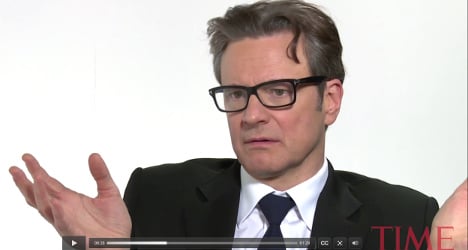He’s perhaps best known for his portrayal of gentleman Mr Darcy in the screen adaptation of Pride and Prejudice. But in a recent video interview actor Colin Firth showed he can also be foul-mouthed when called upon.
In a video interview with Time in April to promote his new film The Railway Man, the star, who is married to Italian film producer and director Livia Giuggioli, spoke, among other things, of his love of Italian swearwords.
Asked what his favourite word in Italian was, the 53-year-old Bridget Jones' Diary star replied: “The insults are wonderful because they use them more sparingly than we do but they really do use them to great effect. ‘Stronzo’ is a wonderful word.”
By way of explanation Firth added: “It means a piece of shit. But it’s more specific than that – it means a floating piece of shit.”
He also spoke of the importance in Italy of making a good impression – “fare bella figura” in Italian – and how there was no single word in English for “figuraccia”, which loosely translates as making a bad impression of yourself.
During the interview, the star, who started learning Italian when he and Giuggioli began to date, said his Italian was good enough for him to act in an Italian film just as long as he was playing an Englishman.
“I couldn’t be mistaken for an Italian,” he said.
Since the interview was published on April 16th it has gone viral in Italy, with the video appearing on several Italian news websites.
"Colin Firth and Italian swearwords pronounced with perfect British aplomb," read a headline on the Italian cinematic website Bad Taste.
Meanwhile, the Italian website Fanpage praised the actor's wife for teaching him such good Italian: "His Italian wife Livia Giuggioli has been a good teacher and the class with which the famous Hollywood actor pronounced Italian swearwords such as 'stronzo' immediately spread round the world."
Don't miss a story about Italy – Join us on Facebook and Twitter.




 Please whitelist us to continue reading.
Please whitelist us to continue reading.
Member comments